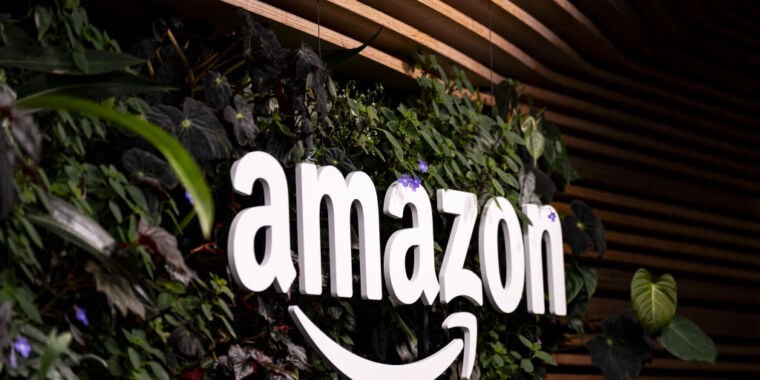Last week, the Federal Trade Commission sued Amazon, alleging that the online retailer was illegally maintaining a monopoly. Much of the FTC’s complaint against Amazon was redacted, but The Wall Street Journal yesterday revealed key details obscured in the complaint regarding a secret algorithm. The FTC alleged that Amazon once used the algorithm to raise prices across the most popular online shopping destinations.
People familiar with the FTC’s allegations in the complaint told the Journal that it all started when Amazon developed an algorithm code-named “Project Nessie.” It allegedly works by manipulating rivals’ weaker pricing algorithms and locking competitors into higher prices. The controversial algorithm was allegedly used for years and helped Amazon to “improve its profits on items across shopping categories” and “led competitors to raise their prices and charge customers more,” the WSJ reported.
This isn’t surprising. But it’s gross and fuck Amazon and Bezos.
Here’s hoping something comes from the FTCs suit. I’m not hopeful. I’m sure it’s Amazon’s right to fuck the consumer and other businesses or something lol
It’s the kind of thing that’s so blatant you forget it’s wildly illegal.
If only Republicans hated corporations then maybe someone would do something like organize a international convoy.
One who owns something usually don’t hate it
Sure, it’s illegal and horrible, but how else is Bezos supposed to ride his giant metal dildo into space?
Ask for donations. I would gladly donate for a one way trip into space for billionaires.
As long as we get to pick their destination, sure.
The sun.
Indeed.
Might as well… So don’t delay. Act now!
deleted by creator
Don’t know which plugin that is
deleted by creator
Interesting. We have a price comparison site in my country which, instead of selling personal data, has stores pay to be in their lists of stores they track.
Yeah I’ve got my RSS camel feeds to alert me on price drops. Anything that isn’t needed immediately goes there
*Made a little less than 1B, they have to give the government a 0.01% cut because they got caught.
I “love” US companies that increase their profit with illegal and secret algorithms (no effort). Hope for big fines (50%, here we come!)and long lasting bans.
But not only 50% of the additional profit - should be something like at least double or triple that.
It’s ‘The Formula’ from Fight Club:
I was a recall coordinator. My job was to apply the formula.
A new car built by my company leaves somewhere travelling at 60 mph. The rear differential locks up. The car crashes and burns with everyone trapped inside. Now, should we initiate a recall?
Take the number of vehicles in the field, A. Multiply it by the probable rate of failure, B.
Multiply the result by the average out-of-court settlement, C.A x B x C equals X. If X is less than the cost of a recall, we don’t do one.
The key to preventing this kind of thing is to make sure that X is always considerably higher than A x B x C. If monetary penalties are all that are being assessed, they need to be fucking astronomical to the point that no reasonable company would even consider taking the risk of getting caught, no matter how minute that risk is. Until we start operating like that, there’s simply no incentive for any of these companies to stop breaking the law.
And start throwing executives in jail.
This is the real answer
If the penalty for a crime is only a fine, then that crime only exists for the lower class
I am sorry, however you provide some interesting information, this case has noting to do with recalls.
It’s a quote from Fight Club; I know this case has nothing to do with recalls. The point applies to any corporate lawsuit.
Let me re-frame it, if that helps:
Take the number of users, A. Multiply it by the expected per-user profit from price-spiking practices, B. Multiply the result by the chance of not getting caught / fined, C.
A x B x C = X. If X is greater than the expected fine for doing this, we’ll do it even though it’s illegal.
The point is that the penalty / fine that’s assessed needs to far out-weigh the potential benefit, taking into account the chance of getting caught / fined in the first place. If they stand to make $10 million in profit, and the penalty for getting caught is $100 million, but the chance of getting caught is only 5%, their ROI is positive and it’s simple numbers - they’ll do it every time.
If in the above example the penalty was $1 billion, suddenly the ROI is negative, and they won’t do it. It’s simply math. By having penalties that are too low to impact their overall profit, they simply don’t work as a deterrant.
A $1.5 Billion fine would work as deterand.
But I am afraid US politics won’t allow it.(lobbying)
That increased their revenue by less than 0.2%. Fuck people over to squeeze out every little bit of extra revenue you can get to make those shareholders happy.
deleted by creator
0.2% of 5bn is 10 million dollars. Am I misunderstanding something?
Nope. Pre coffee math in my head. My bad. Still a lot of fucking money though.
Why the fuck not when the penalty is probably 1/20th the profits…
Damn Loch Ness Monstah got way more than tree fiddy
Didn’t Amazon discounted Project Nessie because it wasn’t making them enough profit?
Removed by mod
What’s next? Ads that are targeted at us?







